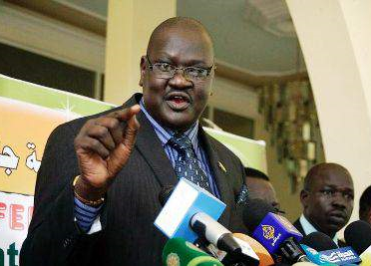South Sudan presidency considers lifting state of emergency in Upper Nile
May 20 2016 (JUBA) – South Sudanese President, Salva Kiir, has begun high level technical consultations and discussions with security and legal institutions to determine whether or not he should lift the state of emergency which he declared in the states of Upper Nile region at the start of the December 2013 violent conflict.

The lifting of the state of emergency, according to Ateny, is an urgent matter because citizens in the states of Upper Nile region have not been moving freely after signing the peace agreement in August 2015.
“This is a concern and it is the next phase of the presidency which now includes the president, the first vice president and the vice president, so [that in] the next few days lift the state of emergence and allow the citizens from both controlled areas to be moving actually freely,” explained Ateny.
The armed opposition faction of the Sudan People’s Liberation Movement (SPLM-IO) led by the first vice-president, Riek Machar, have called on the new unity government to lift the state of emergency in the country.
President Kiir declared the state of emergency immediately after claiming there was an attempt from his colleagues within the leadership of the governing SPLM to remove him from power and install a leader of their choice.
The alleged coup followed a disagreement resulting from debates about internal reforms and democracy in 2013 after the president, who also chaired the SPLM party, failed to convene a national convention per schedule.
He also declared a dawn to dusk curfew at the national capital, Juba, effectively allowing members of security and military intelligence officers to make arrests without warrants and search people’s homes.
The curfew was later lifted after military confrontations reduced in and around the national capital, Juba, and after many people have also blamed the curfew for a fall in commercial activities at a time when the government was trying to create jobs and to raise revenues to finance its expenditures.
But while the state of emergency was lifted in Juba, the decision left out the states of Upper Nile region where many have continued to live at the mercy of security and army commanders even after the signing of the peace deal in August 2015.
The partial lifting of the state of emergency continued to give extra powers to the security services to carry out extra-judicial decisions, including arbitrary arrest, detention and execution of people found in the contested areas, effectively restricting movement of the civil population in the region.
It is unclear when the actual date of discussions involving president, first vice president and the vice president would convene.
It is also not clear whether the state of emergency in the region would be lifted at once or it will be partially done, until when the authorities feel the region is safe and stable from unrest.
Security authorities, however, said they will continue to be deployed in the hotspot areas and towns across the country to tighten control.
Stringent limits on freedom of movement are expected to remain in place.
(ST)
